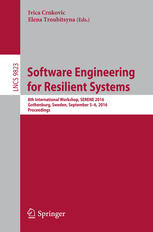

Most ebook files are in PDF format, so you can easily read them using various software such as Foxit Reader or directly on the Google Chrome browser.
Some ebook files are released by publishers in other formats such as .awz, .mobi, .epub, .fb2, etc. You may need to install specific software to read these formats on mobile/PC, such as Calibre.
Please read the tutorial at this link. https://ebooknice.com/page/post?id=faq
We offer FREE conversion to the popular formats you request; however, this may take some time. Therefore, right after payment, please email us, and we will try to provide the service as quickly as possible.
For some exceptional file formats or broken links (if any), please refrain from opening any disputes. Instead, email us first, and we will try to assist within a maximum of 6 hours.
EbookNice Team

Status:
Available4.4
16 reviewsThis book constitutes the refereed proceedings of the 8th International Workshop on Software Engineering for Resilient Systems, SERENE 2016, held in Gothenburg, Sweden, in September 2016.The 10 papers presented were carefully reviewed and selected from 15 submissions. They cover the following areas: development of resilient systems; incremental development processes for resilient systems; requirements engineering and re-engineering for resilience; frameworks, patterns and software architectures for resilience; engineering of self-healing autonomic systems; design of trustworthy and intrusion-safe systems; resilience at run-time (mechanisms, reasoning and adaptation); resilience and dependability (resilience vs. robustness, dependable vs. adaptive systems); verification, validation and evaluation of resilience; modeling and model based analysis of resilience properties; formal and semi-formal techniques for verification and validation; experimental evaluations of resilient systems; quantitative approaches to ensuring resilience; resilience prediction; cast studies and applications; empirical studies in the domain of resilient systems; methodologies adopted in industrial contexts; cloud computing and resilient service provisioning; resilience for data-driven systems (e.g., big data-based adaption and resilience); resilient cyber-physical systems and infrastructures; global aspects of resilience engineering: education, training and cooperation.